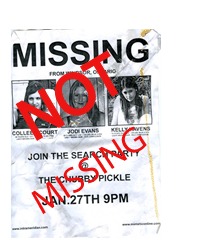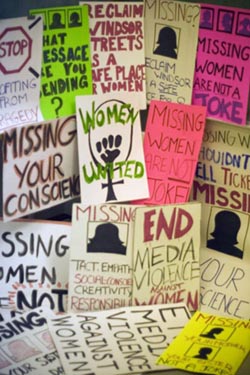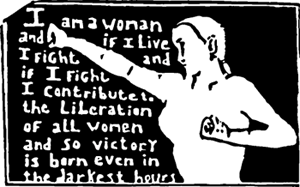THIS magazine, “the leading alternative Canadian magazine of politics, pop culture, and the arts” still says that Heath and Potter’s article “Feminism for Sale” will be online soon. Harumph. I’m about ready to give up. I’ve been waiting since at least November for it to go public to put up this post. How can we have a thorough discussion of the article and its issues until the editors make it available? I read the print article and was blown away by it – there’s no way that these two can be taken seriously. With this week’s Carnival of Feminist being about Feminism and Pop Culture I figured now was the perfect time to post it – maybe the article will still make it up someday. Or maybe THIS Magazine has changed their mind following the backlash in their letters section. john_d at the THIS Magazine blog says, “I don’t know if any THIS Magazine article has ever received more letters of complaint than Feminism for Sale.”
So in case you haven’t read it: Heath and Potter provide a superficial overview of the second wave feminist movement. Although they make reference to some ‘big names’ and a partial agenda of the 1960s and ‘70s women’s movement, they do not give credit to the depth of issues interrogated, the progress made, the personal empowerment of large numbers of women and the impact second wave feminism has had around and beyond the American borders.
It is hard to have a neutral reaction to this piece. Whether or not a reader believes that feminism has lost its steam and that the women at the forefront of the second wave have sold out to the technocracy (THIS Magazine, September 2005, p. 220), readers will definitely find themselves engaging in (and I hope vehemently objecting to) the writing of Heath and Potter.
Within any activity or organization, there are always pieces to criticize, feminism and feminists of yore included. However, Heath and Potter hardly present both sides of the story, preventing readers from drawing their own conclusions. Perhaps because this piece was written for publication in a magazine it draws more heavily on emotional persuasion through its chosen topics and the style of language used. Its purpose is not to present facts or inform but to persuade, challenge, and even enrage. THIS Magazine’s focus is alternative pop culture and political issues and certainly feminism and the second wave fall into these categories. Unfortunately, because their approach is to enflame rather than methodically critique the second wave it is difficult to accept their article as a legitimate critique of contemporary feminism.
The first question to ask regarding this article is who are Heath and Potter? What authority do they have to speak of – and comment on – feminism? Whose voice do they represent and whose interest do they protect? Further, whose voices do they present? The authors do not provide first-hand experience with either the second wave or third wave women’s movement. To truly understand a movement or a perspective it is necessary to enter it and participate. Heath and Potter show no indication of actually having spoken to today’s feminist activists. There are no personal anecdotes of third-wavers, no quotes, nothing. Where are the women????? Again and as always, they are hidden beneath the voice of patriarchy, the very voice Heath and Potter represent. Their failure to situate themselves weakens their credibility.
And another thing! Where are the Canadian voices? THIS Magazine is a Canadian publication yet the feminists Heath and Potter discuss are all American. Everywhere we turn, Canadians are subsumed by Americana: culture, technology, politics, and the arts. Here, in this counterculture magazine of all places, an effort be should made to include Canadians and Canadian content, whether or not the authors support or recognize their activism. Given that the majority of Canadians will never pick up a copy of Herizons, where will they ever read about their Canadian foresisters? Heath and Potter do their best to make sure it is not going to be in THIS Magazine. Canadian women are alive and kicking and it is time that this is recognized.
Regarding the issues discussed in Heath and Potter’s article, I want to address these that I think are especially significant: women’s self-esteem, rape/pornography, and the thrust of the second vs. third wave movement:
Heath and Potter claim that women have easy confidence, and are taking over universities and preparing to dominate the job market (214). Many women that I know struggle with their self-confidence and feel an incredible pressure from their surrounding culture to look and act a certain way. Where are the women to whom Heath and Potter refer? The rates of eating disorders among young women in Western society show that self-esteem hardly comes “easy” to women. Although there are increasing numbers of women enrolling in universities, these enrollments are hardly spread equally across all disciplines. Men still dominate engineering, science, math, graduate and doctoral programs, and higher positions of administration. To say “women are taking over universities” (214) is a gross misstatement. The same is true in the job market. Women continue to dominate the pink-collar ghetto and experience the phenomenon of the glass ceiling. Struggles to find the balance between career and family responsibilities prevent many women from “dominating the job market” (214) as Heath and Potter suggest. Perhaps including some statistics would help their position here – if there were any.
Heath and Potter should also back up their statement that “despite some vague claims about matriarchal societies in the distant past, most of the available evidence suggested that all major cultures throughout history were patriarchies” (216). This is pre-history. There are no written texts from this period. Modern archeologists have to interpret artifacts without any input from ancient peoples. I will concede that research supporting matriarchies is impossible to confirm but it is equally difficult to disregard what has been uncovered. To suggest that the evidence favours patriarchy over matriarchy when there is no way to confirm either is unacceptable.
Further disturbing is Heath and Potter’s discussion of rape. They claim that an “entire generation of young men is now entering adulthood, having come of age in an environment that is completely saturated with pornography” (219). Heath and Potter claim that according to MacKinnon’s work, this saturation should have led to the “ultimate nightmare scenario” (219). Heath and Potter fail to recognize FEMINIST campaigns regarding education about sexual consent (e.g. No means No), the emergence of porn/erotica without scenes containing violence against women and other sexual forms of expression that continue to grow (e.g. online instant messaging and chat rooms). But even given all of this, men still rape. How much rape per capita are Heath and Potter willing to accept? Feminists say NONE. If one woman is raped it is a sign that men still feel the power, desire, and ability to dominate women and this is a problem. Moreover, regarding their claim that we have not entered a sexual apocalypse: there are many signs that this is indeed upon us. Sex, that is, women’s sexuality, is commoditized and enlisted to sell anything and everything. Sexual harassment is a reality in the workplace, in schools, and in society-at-large, and little girls’ clothing is sexualized to the point where lingerie stores have storefronts which cater to girls who have not yet hit puberty. Children are being exploited as sexpots! To me, this bodes apocalyptic.
Heath and Potter suggest that at the core of the second wave movement was women’s “collective victimization” and this contrasts with the third wave focus on “personal responsibility and individual achievement” (220). They criticize third wavers of culture jamming the second wave’s critique of culture (220). What Heath and Potter do not recognize is that the second wave accomplished much more than a critique of “beauty culture, sexual abuse, and power structures” (220). These activists made progress for women in the workplace, in sexual liberation politics, and in the culture of the day. The result of this is that third wavers have a greater public visibility than previous generations. And yes, since there are more women with independent lives and resources, there will be more *stuff* created by them and for them. Art and business can go hand-in-hand and it was never the intention of the second wavers that women take a vow of poverty. What they asked was that women make conscious choices regarding their consumption. Creating and owning property does not make today’s women sell-outs to their forerunners. It means that we have had progress. Before the second wave, it was still difficult for women to have earnings to invest in their own enterprises. Now they do. This is good.
Activism never ends. For each goal that we reach many more are discovered along the way. Feminists are in the struggle for the long haul, whether the issue is the beauty/cosmetic industry, sexual abuse, gendered division of labour and equality in the workplace, etc. Heath and Potter do not give any credit to the extensive achievements that were made by the second wave women’s movement. Perhaps this article has been effective in jarring people from any impending complacency and inciting them to action before mass society has the opportunity to believe what they read in This Magazine.
So pardon me Heath and Potter: this is OUR revolution and while you are welcome to join us, until you talk to the women doing the work here, we will speak for ourselves, thank you very much.
 Comments(0)
Comments(0)


